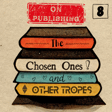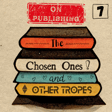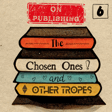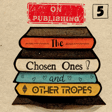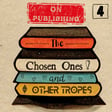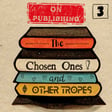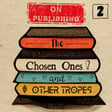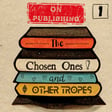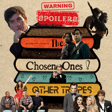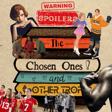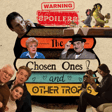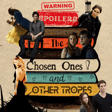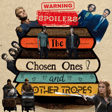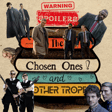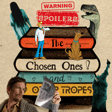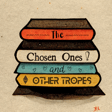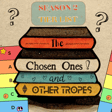Become a Creator today!Start creating today - Share your story with the world!
Start for free
00:00:00
00:00:01

S2.E7 - Miscommunication
It's a weird one to talk about because it only really comes up when it's done badly. Tune in to hear us try and define it, whilst constantly contradicting our own definitions but sort of, vaguely getting close to an understanding by the end. Maybe.
- Naomi Gibson, author of Every Line of You, Game Over Girl
- Melissa Welliver, author of The Undying Tower, My Love Life and the Apocalypse
- Jamie Greenwood, creator & host of the Write and Wrong Podcast
Transcript
Introduction and Favorite Tropes Discussion
00:00:00
Speaker
Welcome back to the chosen ones and other tropes where I ask two published authors about their favourite tropes and the ones that make them want to cry. Um, you know the Hunger Games? And now... I do know the Hunger Games. I've heard about it. Yeah, you do know them, yeah. Essentially what the duzzies do to him is not parenting, it's child abuse. Yeah. Beautiful. Man's playing a G-nanny as well. Might be familiar to you.
00:00:26
Speaker
It's not as fun though, is it? It's tragic, isn't it? It's too impressive. But it isn't Neville. It's just not. It's never going to be him. Yeah, Neville. She shouldn't have done that. She's trying to make Neville happen.
Miscommunication as a Plot Device
00:00:40
Speaker
I presented this one to you guys as bad communication. Then I tried to look it up and realised it was miscommunication, which I thought was ironic. That's brilliant.
00:00:52
Speaker
So talking about miscommunication, otherwise known as poor, bad, terrible communication, it does kind of feel like a sort of low hanging fruit for writers of getting two characters to butt heads.
00:01:08
Speaker
I think it's true of any trope that if it's done well enough, you don't think about it right away. Um, but there are some where when you see it, you're kind of like, but with this one, I feel like when I, for me at least, when I see it and I, it's just so annoying and like, it's so infuriating. Um, so I was thinking of lots of examples and, uh, I, there's, I imagine there's a ton that I've missed, but.
00:01:35
Speaker
as is tradition, I will throw it over to one of you guys. And I feel like Melissa is also not going to like this. So Melissa, you can go first. Yeah, I absolutely hate this. This is like my least favorite. It's something that even before we start talking about tropes, like for years, I've always said how annoying this is because it does come up quite often.
00:01:54
Speaker
on soap operas. And because I literally never leave my house, I watch quite a few soap operas. So I watch Coronation Street religiously, have done stuff like a baby. And they use this all the time on long running things. So it'll just be, let's one at the minute where somebody has a terminal illness, and it would literally solve so many problems if he just told his loved ones he had a terminal illness, but nope, we're doing it. Literally no reason given. And that's the thing that bugs me the most is it's manufactured tension
00:02:19
Speaker
because if the person just said, admitted their feelings in the relationship or told about their loved ones about this thing, whatever it may be, if they just said it and there was pretty much no reason to not say it apart from maybe a vague emotional reason, it would solve all of the problems within the fiction, but they've just decided not to. So it's not a real obstacle, like it's not a real obstacle because there's a way around it. You're just choosing not to take it and it really annoys me. Like I was trying to think of,
00:02:45
Speaker
a time when maybe, especially with emotional reasons, like somebody gives a really good reason for not telling somebody something. And I genuinely was struggling to come up with one. I'm hoping you guys have maybe come up with one, because the one that sprang to my mind immediately, of course, was we just went Edward in twilight hears somebody's at a funeral and decides to immediately fly to Italy and kill himself. And I'm like,
00:03:07
Speaker
And he crushes his phone so they literally can't speak to him. He's like, you know what guys, I have a really cool flip phone because I'm rich and it's 2006, but I'm going to crush it. So you can't even call me back. And it just, ah, so angry. So angry. Anyway, yeah, don't love it. That might be a new record with how quickly Twilight's come up.
00:03:25
Speaker
But you're so right about ongoing stuff because one of the first things I thought of was, you get all these TV staples, ongoing series, at least, you know, these are the ones that we grew up on at least is that in the early 2000s when you had things like the OC, One Tree Hill, Gossip Girl,
00:03:44
Speaker
And the couples have to sort of break up and get back together on like a pretty much a seasonal basis. So like those are, those are long running, but they're not even as long running as like Coronation Street. I'm sure they drag it out for dozens of episodes. Yeah, 63 years I've been running. Who's counting?
00:04:04
Speaker
But in like the OC, I remember there's so many episodes where like back in the olden days when there was like a sort of each episode had its own story arc that was sort of isolated within that and then there was also a grander one in the background. But like almost every single one of those was romantic and they all could have been resolved within the first 30 seconds of the episode if you know Ryan had gone to Marissa and been like,
00:04:31
Speaker
Oh, this thing. But no, we have to sit through and suffer the consequences of you guys refusing to say, to have like a conversation. It's so infuriating. Naomi, what do you think? Um, so yeah, I agree.
Impact of Miscommunication in Various Genres
00:04:45
Speaker
It's not for me, but it can be funny. But, um, so generally for the first part of what I said, I think, um, I find bad communication actually in a lot of
00:04:58
Speaker
adult thrillers. And I'm not going to say here and slag them off. So like, I'm not going to name them. But I find that you get a married couple who don't communicate with each other. And a lot of the plot revolves around this couple who have secret bank accounts and are obviously cheating on each other. And it just creates tension with capital T. And I don't like that. And I just think, you know, it's not so hard to have an actual
00:05:23
Speaker
conversation with your spouse. And if your entire plot can be resolved by having a conversation with your spouse, then you don't have enough stakes. But I think, like we were just saying, I actually find it quite funny in some sitcoms. Like I was thinking about it and there are a lot of sitcoms that use this consistently.
00:05:43
Speaker
Like, Frasier came to mind, I think a lot of the set of their episodes is that Frasier thinks one thing and it's actually something else. And it occurs regularly between him and his dad, similarly between Daphne and Niles. And I think you get it a lot as well with Leonard and Penny in the early days of Big Bang Theory when they just need to communicate with each other. And Sheldon. Sheldon, yeah, for Sheldon.
00:06:10
Speaker
Because both of those, I think, because Frasier with Daphne and the Cranes is, well, the brothers, not the dad. It's a class difference, right? And it's like, this is how one group of people sees each other. And that's the same as Penny and Sheldon and Leonard, right? Because they're so opposite. Yeah, exactly. That makes sense. But it can create funny setups if it's like a harmless miscommunication, you know?
00:06:39
Speaker
If it's genuinely bad communication where people just need to have a conversation with each other, then yeah, that really irritates me. That's a great point. I'd not even thought about that as like a sort of light comedy thing, which obviously is something like... I think they do it loads in things like faulty towers.
00:06:59
Speaker
Yeah, absolutely. That's a really good one. Yeah, just like a silly slapstick miscommunication. Yeah. I mean, that's not how I think when you talk about the miscommunication trope in romance, I don't think that's what people think of immediately, but yeah, it's the same. It's on the same trend. I think so.
00:07:18
Speaker
In books, I do think that there's a trend of it happening especially in YA trilogies. I think it happens a lot in the second book because the first book often wraps with the couple together or all on the way to being together. And then what happened in the second book is like,
00:07:40
Speaker
one of them will start acting sometimes it seems like out of character but then you can kind of argue it's like oh well this is because the characters actually didn't know each other very well because a lot of these books take place in a matter of like weeks or months. So one example I thought was within in Divergent.
00:08:01
Speaker
So in the first divergent, you mostly follow Triss, but obviously she meets Four, and that's the romance out there. But Four is quite cool, calm, and collected in the first one. And then in the second one, he gets super needy and petty. And he sort of resents Triss for not giving him all of her attention all of the time.
00:08:25
Speaker
And this is Triss whose entire family has just been taken away from her and her brother's evil. And he suddenly becomes this very petty person. And you're like, yeah, sure.
00:08:41
Speaker
They didn't know each other, but it's still like really annoying, isn't it? Yeah. There's a lot of secrets as well that clearly he's keeping because they don't appear in the first book. So it's just like, what's the plot? We're going to see the faction list. Why are we seeing them? You'll find out when we get there. Hello, mother. That's okay. You just said that your mum is like the mum in the faction list. I don't know why you didn't just not want to like mention it earlier before the brother's nearly pushed off a moving train and is nearly murdered. I mean, I think about it.
00:09:08
Speaker
Her parents are really high up in abnegation. It's not like it would have been a shock for her. She's from that kind of background anyway. Why'd she just not say anything? That reminds me that there's like a subsection of this, which is so annoying, is when people play the pronoun game. They'll be talking about another character that they know and are familiar with to someone who doesn't know them. And they'll only refer to them as he, she, them.
00:09:37
Speaker
I never say their actual name. Yeah, and then they assume it's about someone else or yeah.
00:09:42
Speaker
No, but like they don't even assume it's by someone else. It's just like, this is not a natural, it's for the audience, it's for the reader. I was watching the new Ant-Man recently, Quantum Mania.
Miscommunication in Popular Films
00:09:54
Speaker
Oh, I'm sorry. Yeah, thanks. Thanks, guys. But the whole thing could have been resolved by Michelle Pfeiffer's character. So she was, in the previous Ant-Man, she was like trapped in the quantum realm and then they've saved her.
00:10:10
Speaker
Which, and like, I don't mind that you're retconning stuff and like making things up, you know, after the fact, fine. But the idea is that she met this super powerful like megalomaniac who wants to take over the universe down there. And he'd been banished and imprisoned to that place by like other people to basically protect the universe. And she decided as a character to not tell anyone about this ever. So
00:10:39
Speaker
The rest of her family and team are trying to get, I can't even remember why they're trying to get down there, but they are trying to get down there. And she's suddenly like, oh my God, no, you can't go down there. Like out of the blue, she's never talked about this or anything like that before. And it gets even worse because even when they all get stranded down there, she still doesn't tell them. And she just keeps referring to this person as like him. Oh, he'll find us. And I'm like, what's going on? And who talks like that?
00:11:10
Speaker
Although Naomi's right, it is also used for, they think they're talking about somebody else. And that is also equally as annoying. And if you just asked, well, who are you talking about? It's like, oh, and I see it was this person or a lot. It's like just in real life, you just use people's names. They stop being weird about it. Which actually happens in Shrek.
00:11:29
Speaker
You know when Fiona is talking about how ugly she is as an ogre and Shrek thinks that she was talking about him. He overhears it. Yeah. Oh yeah. That's so much freckier than Shrek. That's like in the second one where Shrek's father-in-law won't just say, hey, I'm the king, I'm a frog, we're being blackmailed. Yeah, that's so true. Why not just tell your daughter what's happening? For goodness sake, she's been in a town with a dragon for 10 years. Oh yeah.
00:11:59
Speaker
That's funny. I don't mind the frog ones dumb with the dad, but I don't actually mind the other one. I don't know why, because it feels like I'm being unfair to the other examples of this, but that doesn't seem so... It seems so in character for Shrek, who is very sensitive and has lived. Yeah, because he's quite positive.
00:12:24
Speaker
I see what you mean, but then what about when it depends if the whole plot revolves around it though, it's annoying. So I don't know if you've read or seen atonement, but the entire plot revolves around what's happening. The entire plot is that Bryony looks through a peephole
00:12:40
Speaker
at her sister being a bit naughty with James McAvoy and then she's like that's it gonna tell everyone that like he's raping her and it's just like what's happening what why are you not just asking people questions no we must haul them away immediately by the police and have several years with sad stuff happening it's just like oh why are we believing this small child why aren't we just having a conversation so true and it's the whole plot and that bugs me
00:13:06
Speaker
What I did notice is it happens a lot in romance stuff, which is probably why it's generally considered a romance trope. I believe it's because having a miscommunication is one of the
00:13:25
Speaker
It usually comes in, it's the like third act, it's the dark night of the soul, it's the all as lost moment that you kind of need. And it's one of the only ways to have the two characters who you've built up as a couple to this point, fall out, think that it's all over, but
00:13:41
Speaker
while saving face for both of them because in theory, neither of them was doing the bad thing. Do you know what I mean? It can still be annoying, but there's one that I thought of which is in Stardust where it's right towards the end of the film that they've gotten together. They're staying at this inn and
00:14:07
Speaker
inexplicably, he wakes up before her, goes downstairs and leaves a message with the innkeeper who seems like an idiot. I do remember this. And he is an idiot. But it's like, you didn't write a message. He literally gave him a verbal message and was like, this guy doesn't seem switched on. And he's supposed to give it back to her. And then it was also like a stupid game of word order and punctuation where he was like,
00:14:33
Speaker
He was like, Oh, I just, he told me to tell you that he's sorry, but he's found the woman. He wants to spend the rest of something like that. And it makes it seem like he's good. He's like dumping her after they've like slept together. Yeah. And then she goes and does the Edward Cullen and goes to kill herself. And it's like, what are you doing?
Miscommunication in YA Literature
00:14:56
Speaker
Yeah. Just wake her up. It's fine. Yeah.
00:15:00
Speaker
Why didn't she wake up? I would rather be woken up. But I do think they do it in, I think it's a lot of romance because it is a way of not kind of like tarnishing both of your characters too much whilst also creating a conflict after they've already gotten together.
00:15:20
Speaker
Yeah they do it a lot in um after and also to all the boys of love before it's quite common in all of those movies pretty much every single one has some form of oh like okay so the big one I always think of is you know where they say I always think of my dog Skip with this where he tries to abandon Skip
00:15:38
Speaker
And then he says, go on gear, I don't love you no more. But obviously does love Skip. And he's pretending he doesn't love him. And like every romance usually has something like that. So at the end of the first after he says, well, doesn't matter Tessa that it was a bet because I never loved you anyway. I'm a bad boy. You you're not right for me. You're not cool enough. And he goes home on the bus to like her house or whatever. So I think that's quite a common one as well, where they pretend not to love them because they're not good enough for them. That's like a really common one. I hate that.
00:16:09
Speaker
Also, Melover, I think you're ready to record audiobooks, because that was amazing. I do all the voices. She's on my website. The Hating Game has it as well. I watched the movie recently, so I've got it all. It has all the tropes in it. And it's the same as Tall Boys I Love Before and stuff like that. Something that's so common in
00:16:36
Speaker
a lot of these is the overhearing a conversation out of context. Yeah. So in the hating game, she overhears the, the, the, they're supposed to be him and her are competing for the same job, basically. And she overhears him telling his boss, um, like she, oh, she's not going to be a problem or something. And she then assumes that he has been like faking the relationship with her and he's just trying to undermine her so that he can take the job. And then you find out later that he's actually taken a job somewhere else. And I'm like, it's just, he could, he's just annoying.
00:17:06
Speaker
He could have just said it. How are these people not nosy? How do they not ask? If I ever heard a conversation, I'd creep around that corner and be like, what's going on? What are we talking about? Where's that? I'm so nosy. All these people just walk away, and then the rest of the conversation sometimes continues, and it outlines what's actually happening. It's like, why? I am so nosy, and I love confronting people, so I would jump out like jacuzzi. What is happening here?
00:17:29
Speaker
But it's even worse because then eventually he like corners her because she's being weird and avoiding him and then they're like, get it all out. And then he still doesn't tell her because he has to keep the new job a secret for now. And I'm like, you're dating. Like this is obviously causing her great stress.
00:17:50
Speaker
But also, do you not think it's like a sign of immaturity as well that they don't just talk to each other and confront each other? Yeah, definitely. I can't get behind characters like that. There's got to be more for me, you know, like if you hear someone... You lose respect for the character, right? Yeah, exactly. You would... I personally would go and talk to them, like you have just said, Melva, you know, if they don't, I'm like, why? You're an idiot.
00:18:15
Speaker
Do you guys think there's a line that separates bad communication from a well-written misunderstanding?
00:18:30
Speaker
This is what I was trying to think of. This is the problem. I was trying to think of a well-written understanding. Unfortunately, I realized in a book that I've written and I'm editing, I have technically what is probably miscommunication or rather, so this is like a common one. So it's not a spoiler, particularly for my book, because it's like a common trope that's used. So it's hiding something for somebody's own good, but actually is for their own good. So not like in My Dog Skip, where he says, go on, get, but
00:18:57
Speaker
like actually knowing that if you tell them something it will physically or emotionally harm them so you hide it so they don't know about it. That's the only example I can think of where it's sometimes done well and that would make me feel more sorry for the character especially if it's done in a selfless way. So it's not just done in a petulant or don't want to talk about it kind of way. It's done in a and but I'm trying to think of a specific example I don't know if you guys have one of where it's actually it would be bettering you think to yourself oh yeah if you told them that actually that would be worse
00:19:27
Speaker
So you really shouldn't tell them even. Yes, I can think of examples. I didn't think it necessarily has to be a situation where if the thing was told, it would be worse because it could be, it can be miscommunication, but it can be, I was thinking of Pride and Prejudice where the miscommunication is between Elizabeth, Mr Darcy,
Classic Miscommunication Examples
00:19:47
Speaker
and then Mr Wickham.
00:19:48
Speaker
who obviously Mr. Wickham is like lying and presenting a different story to Mr. Darcy, but from what Elizabeth sees, it's, she sees that Mr. Darcy is the villain and Mr. Wickham is the, is the value to her. Yeah, yeah, yeah. But that's just because Mr. Wickham lies to her though, right? Yeah, I guess it's not really miscommunication when one person is actively- I was gonna ask that. Is it like, if it's lying, is it miscommunication?
00:20:16
Speaker
Or is it the communication they wanted all along? Yeah, that's true. No, I'd agree with that. Did you say you had one like me? Yeah, it was a book I read and it was really, really good. It was about a mother and a daughter. It was an adult book. It was going to get darker, so stay with me. The mother and daughter never got on. The mother always treated the daughter badly and resentfully
00:20:45
Speaker
and the daughter never knew why and then she grew up and the mum sort of had dementia as she was getting older and so she was slipping in and out of the past a lot and basically the daughter found out that the mum was S-aged when she was younger and the daughter was the product of that and that was why they had such a bad relationship and it's like I think that counts because
00:21:09
Speaker
Like what you were saying is for your good, your greater good, just let you don't know the truth. Do you know what I mean? And that would, yeah, that was, yeah, not happening. That's how we laughed. One way to resolve it. I just thought of one as well. And Naomi, you've not seen The Last of Us, have you?
00:21:36
Speaker
No, not yet. Well, I'll just say there is one in The Last of Us and I think potentially it's better without communication.
00:21:47
Speaker
Yeah, agreed. But I won't say any more. This is the problem, though, when it's when it's part of like, well, it's not the whole plot, at least in Last of Us, but it is it's a big it's a big part of it at some point. Whereas I was just thinking, isn't like every M Night Shilohman film just communication? And then I thought I'm about to spoil like 15 films if I talk about that. So maybe maybe I shouldn't do that. I was like the village. Yeah, definitely. The others. Mm hmm.
00:22:17
Speaker
There are several things where people are misunderstanding what's happening. Sixth sense, yeah, some cues. But are they misunderstanding it because of the other people not telling them? In the village, yes. In the village you are, yeah. I think the others is as much as a discovery for them as it is for the audience.
00:22:34
Speaker
Yeah, although she did do the thing. No spoilers. She did do the thing. I don't know why we've stopped doing spoilers now. She did do the thing. She did do the thing, right? Miscommunication. I forgot about that.
00:22:49
Speaker
I was only not spoiling for Naomi's benefit. We spoil everything else. Sixth sense, if you haven't seen the sixth sense at this point, then come on, guys. Does the boy know that he's dead? It's a bit ambiguous because the boy, in a way he does, I think he knows before the guy does and chooses not to tell him. I think he discovers at one point that he's dead and thinks, oh, I'd best not say anything, so it'll freak him out.
00:23:20
Speaker
I think the boy knows when to start. You think he knows when to start? He at least knows before the guy, definitely. Yeah, but no, I think he pretends to the guy. He doesn't want to talk to him, you know? It's not because he's a therapist. It's not because he's... He definitely knows. Yeah.
00:23:35
Speaker
So maybe it is kind of in this community. Yeah, in the village everyone's lying to Bryce Dallas Howard, I think it's Bryce Dallas Howard, because she's blind so she doesn't know which is very ableist and awful actually though I think about it but yeah that's like the entire plot hinges on everybody's lying to a certain sector of people in the village and even at the end you don't know whether she knows what's going on
00:24:00
Speaker
Yeah. What I'm realizing is that when it's done well, it's really great use of, I think it has to use dramatic irony. So the audience or the reader has to know something that at least one of the characters doesn't and that's how this works. I guess you would only be able to identify after the fact if you didn't know that. I like it when you know something a character doesn't and you're like waiting for that character to
00:24:28
Speaker
for the penny to drop, which I guess is maybe the point of an M. Night Shiliman film is that they're dropping clues for you. So if you work it out, then you feel, yeah, wicked out before the very famous lead actor works at home.
00:24:44
Speaker
It's not an unbreakable though, which is another one of his good ones, because one character is actively lying to the other. Yeah, no lying we've decided is different. Yeah. Yeah. Because it's, because it it's, yeah, one, there's nothing, there's no miscommunication. Yeah, I agree. One character is presenting a narrative that is not true. What about Shutter Island? Do you think that counts?
00:25:10
Speaker
They're kind of lying to him, aren't they? They are lying to him. Yeah, they're leading through a scenario, aren't they? Yeah. But again, I would say, yeah, they are in control of a narrative that they are presenting. I think for miscommunication to work, both people have to be confused about the thing. Yeah.
00:25:34
Speaker
So, so like the, there's usually one person who, so let's say, uh, what was the, the, the scrunchie into all the boys I love before, right? Yeah. Like she misunderstands because she doesn't have the context, um, or understand, or can't read his mind. And then he doesn't understand because he's not sure what happened and why it's a big deal. Cause he didn't see it as a big deal. So he would that big deal. So he's not really sure. And he also didn't know that she overheard. So the miscommunication, I think has to happen on both sides.
00:26:04
Speaker
for it to be the full, like in Romeo and Juliet. Yeah. How do we list that one? Very bad ending. Guys, spoilers for Romeo and Juliet. That I thought that potentially this comes into it. Let me know what you guys think.
00:26:27
Speaker
Sometimes characters who, like, can it be miscommunication if the character for whatever reason is just a character that doesn't speak much, whether that's like a language barrier, trauma, or like, because they aren't much of a talker or whatever? So I think that's okay, because that's down to characterisation. Yeah. So like, if your character has a genuine reason for why this miscommunication has occurred, then that's fine with me. You've
00:26:55
Speaker
substantiated it, there's a reason. But if it's just like, genuinely two people just need to have a conversation, then that's where it doesn't work. But if it's because that character
00:27:07
Speaker
is shy or generally has crap communication skills, that's different. Yes. No, that's true. Because I was thinking of something like the terminal with Tom Hanks where he's stranded at JFK airport, but he doesn't speak English. Surprisingly, there's something very wholesome about that because even though he doesn't speak the language,
00:27:29
Speaker
he does communicate surprisingly well with all the people that live there through his actions and stuff. So I guess that's actually good communication. It's just limited communication, I guess.
00:27:39
Speaker
Whereas miscommunication seems to have either an emotional pull or like a sort of, I guess not an evil pull because we're saying that's just lying if you're trying to make sure somebody doesn't understand something on purpose. So I guess usually we're talking about it in an emotional sense of miscommunication, right? So it's like either a reason that they're trying to make you believe something or that somebody's just kicking off and walking away before hearing the whole conversation because they're emotionally connected to the outcome of that conversation.
00:28:08
Speaker
In which case, then if it's like we were trying to find good examples of this and we were saying, oh, well, if someone's withholding information because it's gonna be detrimental if they release it, it's gonna be worse if they release it, then that's then not poor communication by our own definition we just gave because that person's, they're not lying, but they're lying by withholding information. So they're in control of that narrative that they're
Frozen's Miscommunication Themes
00:28:36
Speaker
not misunderstanding anything.
00:28:37
Speaker
I guess it depends. It just depends for me how it affects the plot because if it then affects the plot negatively and the entire plot could be solved by having one sentence of communication, it does still annoy me. That's true. Can't get around it. Well, here's an example for you. Elsa and Anna in Frozen. Just show your magic powers. Stop sending a room. Yeah. Yeah. Come on. If Elsa had just been honest with her and told Anna about it,
00:29:05
Speaker
Yeah. She showed it when she was younger. Exactly, yeah. It was like a small accident where she got a concussion or something. Oh, I know. But like, honestly, I feel- Kids fall over all the time. Elsa, sorry, she was like terrorised into not talking about it and the trolls. Yeah, her parents were awful. I'm glad they died on that shit. That's the second time I've said that. Okay, quite where I was going. But like, how useless were the trolls as well?
00:29:31
Speaker
They had terrible communication. The trolls are the real villain. Like they're the real miscommunication. They speak in riddles. Yeah, like insane things to do. And then they interpreted it very badly. That's the miscommunication. It's between the trolls and the parents. Yeah. So Elsa was like scared into staying quiet. Yeah. But she should have just told her sister to sing.
00:30:00
Speaker
Yeah. It's interesting. What about when a character can't?
00:30:08
Speaker
express themselves. So I was thinking also of Stranger Things and in the early seasons 11, where 11 doesn't really say anything. Yeah, it should be 12. And if we're going to sort of define it loosely as can the plot be affected dramatically if this person just said one thing? If 11 literally just like talked about what had happened and things,
00:30:35
Speaker
in season one, we could have gotten along a lot quicker.
00:30:41
Speaker
Yeah, but then obviously her trauma I guess comes into it. So it's harder to be annoyed with her about that. Whereas like Jacob in Twilight again, he's like, oh, there's a bit where he literally can't say canny and he's trying to get her to remember the story he told her on the beach because he's not allowed to say because the alpha, but then you find out later he could have just been the alpha. It's like, well, come on, Jacob. It's like when you want to break free. That's got like a whole load of plot holes to it as well.
00:31:09
Speaker
it does yeah he's like i literally can't tell you but then as soon as she knows he is allowed to tell her so i don't understand
00:31:16
Speaker
Yeah, I just, yeah, I know. Thanks, Sam. Thanks. It's great. I forgot about him. I'm trying to think if there's any miscommunication in Hunger Games, but I just, I'm just coming up blank. Oh, that's a good question, actually. Apart from the plot of the second one where they don't tell her that they need her to be alive to lead the revolution and all the other tribunists are in on it. That's them lying by omission, right?
00:31:46
Speaker
But what about Gail, who sends in those bombs in the bat in the last movie and his sister dies? Yeah, that is miscommunication actually. He comes up with the idea to bomb all those kids. And he doesn't tell her about it. And then she's like, was that your idea? And he says, I don't know. Yeah. Okay. Prim Reaper, GTFO. The Prim Reaper himself. But not terrible ones.
00:32:10
Speaker
Yeah, this might be the trope that isn't really so obvious in the Hunger Games. Yes. We got it in Twilight though. We got it multiple times in Twilight. I've mentioned the same Twilight movie twice and there were like five movies. I mean, that's shocking. Oh, well, if Twilight then usually also 50 Shades of Grey.
00:32:30
Speaker
Absolutely. Yes. Yes, that's very true. You always wonder, though, in these we've mentioned a few that got really big on Wattpad first, which by the way, I'm totally for like do it. If you write a story of Wattpad, it does really well. Absolutely good for you. Amazing. I wish I could do that. Yeah, it's amazing. But it does mean that obviously you hit certain plot holes to do with they hadn't come up with that idea yet because they were writing 3000 words per chunk for Wattpad. Yes. They weren't coming up with a whole book and then Penguin came along and went, we want to buy it.
00:32:58
Speaker
You have to string it together now and they kind of force them at gunpoint to string it together. Well, what's going to happen is obviously loads of miscommunication to cover up any plot holes that might appear. Yeah, yeah, yeah. Which is no one's fault really. So I kind of don't mind it as much. Uh, yeah, yeah, I don't know.
00:33:14
Speaker
Do you think that, spoilers for My Love Life and the Apocalypse by Melissa Welliver, do you think that, I think there's a little miscommunication towards the end with Echo and Pandora, where they sort of start going, where Echo goes, they sort of go separate ways.
00:33:37
Speaker
Yeah. They're a big fight. Big spooky fight. Gotcha. Yeah, because they misunderstand each other, don't they? But at least they try and talk it out. Yeah, it's bad communication, but because they're both coming at it from different directions, I think. Exactly. Because she wants to trust in humanity and he is very skeptical of that. Yes. I suppose it's technically still bad communication. I guess if they were better at listening to each other, but they are teenagers. Yeah. So they're going to be very good at that, I guess.
00:34:06
Speaker
Yeah, but I think that one works and I think the reason it works is because as you say, they're torn between... He's the pull of he's not actually human, he's a robot and he's innately distrusting and they've treated him very badly, whereas she is.
00:34:23
Speaker
You know other than these people seems like the last human like she wants to be with her own kind so there is they both have distinct pulls to kind of pull away from each other and they do try and talk it out. I think I think that's a well that's a well done one yes what's been somewhat minor to the main story.
00:34:38
Speaker
very well done guys actually in that example. I think also it doesn't affect the entire plot and because it's a dual narrative there's a really important reason they need to go and do their own stuff for a little bit. So I must use it to plow on the plot as opposed to a plot point that could easily be solved because they need to go and discover other stuff.
00:35:05
Speaker
But you know what, I quite like it though, because it makes them go off and be independent for a little bit like you say, but like they come to their own, to come to the same conclusion separately and then come back together. And I just think that's really nice. So you win that.
00:35:21
Speaker
It's brief too. And I think that's the trick with this trope is you can't have the whole plot line hinge on it. Or like you can, but I don't like it. If you have like in small amounts, I think it's fine. I think we, you know, we all misunderstand each other. It's just human nature.
00:35:39
Speaker
Yeah, that's true. That's fair. It's realistic I think in small amounts, but it's, and if you guys watch Ted Lasso is really good at this because Ted Lasso, the kind of twist that Ted Lasso is on sort of most television shows is that misunderstandings happen, arguments happen, and then they're usually resolved within the same episode because the characters go and talk to each other and have a really meaningful conversation and it's very wholesome and that's what makes the show so good.
00:36:05
Speaker
because they kind of defy your expectations of other TV shows where it's like, oh, great, this annoying thing has happened and it's going to drag on for ages. And for no reason, they're just going to argue, but they don't. They go and talk. The characters will talk and they'll come. They'll explain what they what they were both thinking. And then they'll come to. Yeah, you're right. The annoyance is worth it if there's a really good resolution from it. Yeah. Like, OK, I was angry, but I feel like I have been like made content now by what's happened. I'm satisfied.
00:36:33
Speaker
It's a great way for the character to show growth as well. They're like, I got angry at you.
00:36:38
Speaker
I shouldn't have done that. If they literally take accountability and then they go and yeah, this is literally Ted Lasso through and through. We like to round these episodes off with potential traps, dangers within
Advice for Writers on Miscommunication
00:36:53
Speaker
these tropes. So with poor communication, a lot of complaining, one of those tropes that can really take people out of a story.
00:37:06
Speaker
What do you guys, do you guys think there's anything like inherently, you know, dangerous or like to look out for as a writer thinking about doing something along these lines? Like toxic.
00:37:18
Speaker
toxic or just like as, you know, how could you write this? Because sometimes you might just need, it's a planned thing usually. It's unlikely you're going to accidentally do this. So, you know, what do you think people should look out for? And if there is anything you guys think is toxic about this? If you're writing it as part of a romance, I wouldn't have it as your A plot.
00:37:45
Speaker
where you have a miscommunication because that means that your entire book could be solved by one conversation. So I would have it as like what Melva did, just have it as like a little occurrence within the book and just be nice, short and sweet little visit to that trope, I think. Yeah, have it because in my love life it's, you use it, as you say, it's a device to split them up briefly, but this is like
00:38:12
Speaker
two thirds of the way through the book already and they both have a sort of growth arc which brings them back together.
00:38:20
Speaker
Yeah. Yeah. The whole story doesn't hinge on a single. Yeah. I think that's such a good, actually that's such a good way to look at it. Make sure that your whole story doesn't hinge on two people just having a conversation. Yeah. That is very annoying when it's something that it's just, for me, it's the manufactured tension, which annoys me in every trope we talk about. If it's manufactured tension, which means that I, when I get to an obstacle in a book, I want to think, oh, wow, how are they going to get out of this one? I don't want to think,
00:38:47
Speaker
Well, if you just don't walk away, are you still walking away? Okay. I mean, you could just say, nope, nevermind. Okay. Yeah. I guess, I guess this is happening now. I guess this is how it's going to be. I want to like be wondering how they're going to solve it and be pleasantly surprised. Oh, what a great way to solve this problem. I don't want to know the answer to the problem is a two second conversation. Yeah. Yeah. Cause it's annoying. Yeah. And especially when you like know as well, cause you're like, Oh, you know, this, this could have just been an email. Yeah. Um, there's really no need for this entire plot.
00:39:16
Speaker
That's true when you know when the reader knows it is actually even more annoying. It's still annoying a bit when the reader doesn't know. You can usually see it coming from a mile away. However, it is even more annoying when you know how you both feel. Just say, oh God, we've got five more books in the series. Okay. I guess we're not just saying, never mind. I think if you're writing a comedy, perhaps you can get away with it a little bit more. If it creates humour, if it creates something that you actually genuinely enjoy.
00:39:45
Speaker
But in which case then it's again, it wouldn't be the A-plot would it? It would just be something that happens that creates this. I think if it's for humour, then it's also going to be usually for like a sort of one joke or like a series of jokes, which means it'll be short lived. You can do it multiple times, but I think, yeah, it just needs to be sprinkled in. It's probably going to be a lot more harmless as well.
00:40:08
Speaker
miscommunication rather than like someone sleeping with someone else. Well, the miscommunication would be that the character thinks they slept with someone else, but they actually didn't sleep with someone else. There you go. That's how it is. Yeah. But I think it's not like there's, I didn't really see anything toxic or like problematic about it. No. It's just a hard one to get right.
00:40:30
Speaker
much less so than other ones we've seen. The only one I can think that makes me genuinely sad is the atonement example, because horrible things happened to him on the basis of this small child looking through a keyhole. Yeah. She was so unlikable. Oh my gosh, awful, isn't she? I don't think I've ever actually hated someone more. I've watched Harry Potter a lot and I don't like Umbridge. Oh man. Well, before we wrap up, I did have an honorable mention. I didn't mention it because it's not
00:40:59
Speaker
television movie or book beforehand. But the Pina Colada song is bad communication. It is. It's my favorite short story, the Pina Colada song. It's the best short story of all time. It's so weird. I love it. Oh, it's so good. They deserve each other though. They want to have an affair, but then put ads in there. You know how old it is. Yeah, they find their own ads.
00:41:24
Speaker
super weird, but it had a happy ending. But it's comedy as well. So it works like Naomi said, for comic reason, like at the end they go, Oh you, it's great. That's going to be toxic together.
00:41:41
Speaker
Thanks for putting up with our nonsense for another episode. To stay tuned to everything we're up to, you can follow the podcast on all socials at The Chosen Tropes. Follow Melissa at Melva, Naomi at Naomi G. Wright, and Jamie at Jamie X. Greenwood. Don't forget to check out Naomi and Melissa's books as well as the Right and Wrong podcast. Thanks again, and we'll see you on the next trope.
